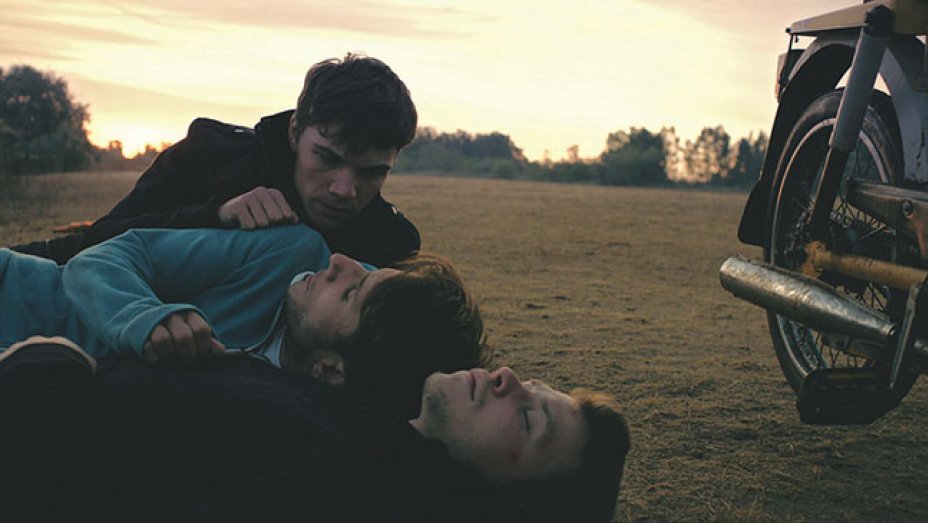Directed by Adam Csaczi, the 2014 film Land of Storms tells the story of Hungarian Szabolcs (Szabi) who first appears in a hyper masculine environment, playing professional football in Germany and drinking, partying and watching straight porn with his friends. Disenchanted with his life as a footballer, after suffering a defeat at the hands of another team, Szabi decides to return home to his native Hungary where he takes up residence in a remote home left to him by his grandparents. The house is ramshackle and almost uninhabitable and he begins the long task of repairing the property, with the help of builder Aron who he happens across shortly into his initial return home.
The film is quiet, sensual and intense with sparse dialogue. The camera sweeps over barren landscapes and empty fields in a way which emphasises the loneliness of Szabi and the isolation of his setting. After time working together on the house, the relationship between Aron and Szabi intensifies into a physical one as their connection leads both men on a journey of self-discovery. There is an understated, homoerotic intensity to their relationship and some stunning visuals, from waking up in one another's arms in a cool sunrise after a drunken encounter on scorched earth to the beautifully shot scene of the two looking at one another through a glass door as they move through the house. In this scene with Aron on one side and Szabi on the other, the two literally and metaphorically dance around one another with a barrier between them.
It's fair to say this isn't a happy film despite the themes of exploration, liberation and freedom to be who you want. There's a powerful undercurrent of homophobia - both externally from the people in the local community and Aron's own internalised homophobia. There is an interplay between sexuality and religion and an exploration of the stigma that might be faced by a young man coming out in a small, countryside village in Eastern Europe. Both Aron and Szabi are subject to violent beatings and encounter difficulties from their parents and family. This is well-trodden ground for contemporary queer cinema set in Eastern Europe, but the focus on the beauty of the lonely landscape contrasting with the way Csaczi embraces sex in a manner which is unflinching without being gratuitous, sets this film apart from others.
In a moment of loneliness, Szabi contacts his old friend and teammate Bernard who makes the journey from Germany to Hungary to find Szabi. The two reconnect while Aron tries to deal with the stigma he's facing from friends and the local community, together with the possibility he might lose Szabi to Bernard.
The decision Szabi ultimately has to take and the way the film ends left me glued to my screen and horrified in equal measure. Based on a true story, I was not prepared for the brutality of the film's conclusion which left me thinking about Land of Storms for days afterwards.
A bold and distressing examination of homophobia, interspersed with tenderness, sensuality, sexual awakening and long moments of quiet contemplation.
It's fair to say this isn't a happy film despite the themes of exploration, liberation and freedom to be who you want. There's a powerful undercurrent of homophobia - both externally from the people in the local community and Aron's own internalised homophobia. There is an interplay between sexuality and religion and an exploration of the stigma that might be faced by a young man coming out in a small, countryside village in Eastern Europe. Both Aron and Szabi are subject to violent beatings and encounter difficulties from their parents and family. This is well-trodden ground for contemporary queer cinema set in Eastern Europe, but the focus on the beauty of the lonely landscape contrasting with the way Csaczi embraces sex in a manner which is unflinching without being gratuitous, sets this film apart from others.
In a moment of loneliness, Szabi contacts his old friend and teammate Bernard who makes the journey from Germany to Hungary to find Szabi. The two reconnect while Aron tries to deal with the stigma he's facing from friends and the local community, together with the possibility he might lose Szabi to Bernard.
The decision Szabi ultimately has to take and the way the film ends left me glued to my screen and horrified in equal measure. Based on a true story, I was not prepared for the brutality of the film's conclusion which left me thinking about Land of Storms for days afterwards.
A bold and distressing examination of homophobia, interspersed with tenderness, sensuality, sexual awakening and long moments of quiet contemplation.
